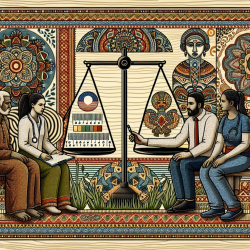Introduction
In the realm of mental health, accurate assessment tools are crucial for effective diagnosis and treatment. However, when it comes to Indigenous populations, traditional depression scales often fall short due to cultural differences. A recent systematic scoping review, titled The methods of improving cultural sensitivity of depression scales for use among global indigenous populations: a systematic scoping review, sheds light on the importance of culturally adapting these tools.
The Importance of Cultural Adaptation
Indigenous populations worldwide have unique cultural expressions and idioms of distress that are not always captured by standard depression scales. The review identifies that culturally adapting these scales can lead to increased acceptance, reliability, and validity. Such adaptations ensure that the scales are not only linguistically accurate but also culturally relevant.
Methods of Cultural Adaptation
The review highlights several methods used in the cultural adaptation of depression scales:
- Revision of Cultural Relevance: This involves understanding the cultural context and ensuring that the scale's content is relevant to the specific Indigenous population.
- Transcultural Translation: Beyond literal translation, this process ensures that cultural nuances are preserved in the translated version.
- Inclusion of Visual Supports: Visual aids can enhance understanding and acceptance of the scale among populations with varying literacy levels.
- Qualitative Methods: Engaging with the community through focus groups and interviews helps in understanding their specific needs and tailoring the scales accordingly.
Benefits of Culturally Adapted Scales
Culturally adapted scales provide several benefits:
- Improved Acceptance: When scales resonate with the cultural context, individuals are more likely to engage with them, leading to more accurate assessments.
- Enhanced Reliability: By capturing culturally specific expressions of distress, these scales offer a more reliable measure of mental health.
- Better Outcomes: Accurate assessments lead to better treatment plans and outcomes, ultimately improving mental health care for Indigenous populations.
Encouraging Further Research
While significant progress has been made, there is still much to learn about the cultural adaptation of depression scales. Practitioners are encouraged to delve deeper into this research area, exploring new methods and populations. Such efforts will contribute to the development of universally applicable, culturally sensitive mental health assessment tools.
Conclusion
The adaptation of depression scales for Indigenous populations is a crucial step towards equitable mental health care. By understanding and implementing culturally sensitive practices, practitioners can ensure that their assessments are both accurate and respectful of cultural differences. For those interested in further exploring this topic, the original research paper provides a comprehensive overview of the methods and outcomes of cultural adaptations.
To read the original research paper, please follow this link: The methods of improving cultural sensitivity of depression scales for use among global indigenous populations: a systematic scoping review.










